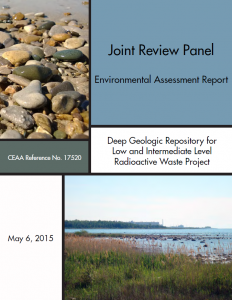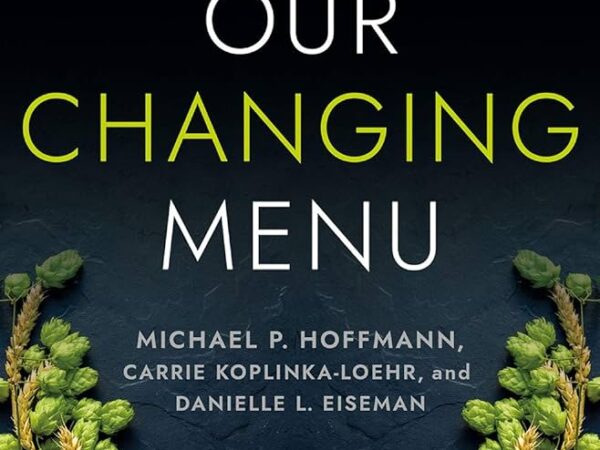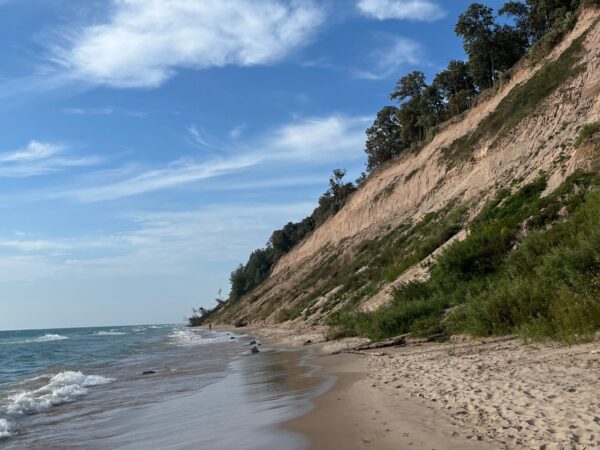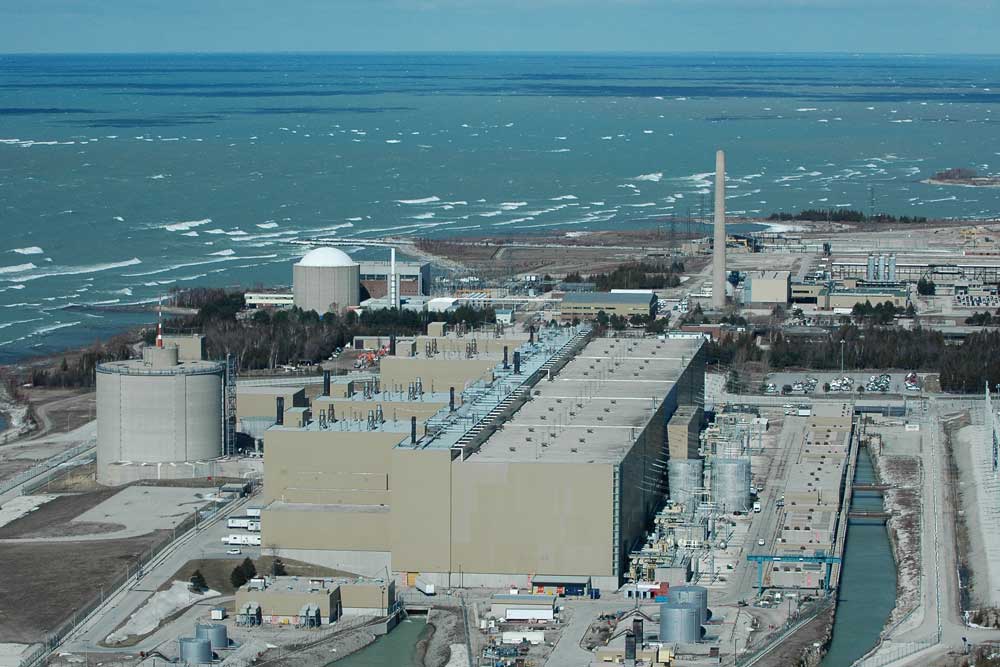
Great Lakes lawmakers say no way
On Tuesday, May 8, Michigan Democratic Congressman Dan Kildee introduced an amendment he says will protect the Great Lakes from the threat of Canadian nuclear waste. He says if a proposed Canadian facility is built in Ontario, it would “permanently store up to 52 million gallons of radioactive material less than a mile from Lake Huron.”
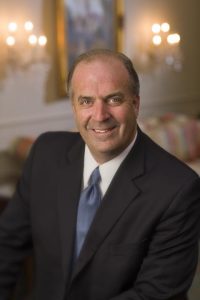
Representative Dan Kildee, Photo by US Congress via wikimedia
Congressman Kildee sent this statement to Great Lakes Now: “The Great Lakes are a precious natural resource that supports our economy and way of life. Permanently storing nuclear waste on the shores of the Great Lakes is too much of a dangerous and unnecessary risk.”
Other Great Lakes lawmakers are piling on.
In an Op-Ed piece published Wednesday, May 9th in the Detroit News, Representatives Debbie Dingell and Fred Upton say the construction of a nuclear waste storage facility in Kincardine, Ontario “should never be a consideration. Yet, a Canadian Utility Company, Ontario Power Generation, continues to seek approval to construct a deep geologic repository for nuclear waste less than one mile from Lake Huron.”
In May of 2015, a federal panel gave an overall seal of approval to the construction of the nuclear waste disposal site planned for a subterranean crypt below the Bruce Nuclear station.
The report by the Joint Review Panel says , “The panel concludes that the project is not likely to causes significant adverse environmental effects.”
Representatives Dingell and Upton disagree, saying it’s dangerous and a threat to the Great Lakes. They write: “This misguided proposal would mean radioactive waste would be buried less than a mile from the water source that 40 million people – Americans and Canadians – depend upon.”
Beverly Fernandez, Spokesperson for the organization called Stop The Great Lakes Nuclear Dump, sent this statement to Great Lakes Now: “Imagine the devastating economic consequences and threat to human health of the drinking water of 40 million people becoming forever contaminated. Communities all around the Great Lakes are unwilling to accept the risk of a nuclear waste dump beside their fresh water. It is imperative that OPG’s reckless plan to bury its radioactive nuclear waste less than a mile from the Great Lakes be stopped.”
Dave Dempsey, Senior Advisor at FLOW (For Love of Water) based in Traverse City, tells Great Lakes Now,” The idea that we can engineer a virtually foolproof radioactive waste repository near the Great Lakes embodies the same arrogance that is leaving Line 5 in place. There is no room for error when it comes to a major oil spill into the Great Lakes and the same is true with even more intensity for a radioactive release.”
Dempsey says, “Politicians talk all the time about the importance of 20% of the world’s freshwater in the Great Lakes, but all too often they act as though it’s 20 gallons. It simply makes no sense to play Russian roulette with the Great Lakes. This repository should be sited outside the Great Lakes watershed. We are glad Michigan members of Congress are leading their colleagues on this issue.”
Great Lakes Now posted a story on the controversy surrounding Ontario Power Generation’s proposed plans to build the nuclear waste storage facility in February of 2017.

Ontario Power Building, Photo by Paul Bica via wikimedia cc 2.0
At that time, Ontario Power Generation’s (OPG’s) Kevin Powers sent the following statement to Great Lakes Now: “The proposal for the DGR (Deep Geological Repository) has been researched for more than a decade, and scientists agree it’s safe.” He says , “The proposal is to move the waste 100 yards from where it currently sits above ground and then bury it 2,230 feet down into some of the most impermeable rock in the world. This rock was created 450 million years ago in an ancient ocean and has survived intact over nine glacial periods and the Continental divide. This proposal would take this waste and enclose it in this rock and seal it, containing it forever. “
Powers says he knows of only one DGR leak so far. He says, “The only DGR (Deep Geological Repository) accident I’m aware of was in Carlsbad, New Mexico when a container disrupted below ground. It WAS a release of radiation, but the release to the environment was below regulatory limits.“
OPG’s Kevin Powers says, “Scientists from around the world have studied this proposal and agree that this would keep the lake safe. It underwent the most rigorous form of assessment in Canada. More than 20, 000 pages of evidence shows this is the right place and right time for the DGS repository.”
Kevin Powers is no longer working for the company. Great Lakes Now reached out to Ontario Power Generation’s new spokesperson Neal Kelly. No response so far but if we get a statement from him, we will post it on greatlakesnow.org.
So far, 230 municipalities in both the U.S. and Canada have passed resolutions opposing the plan, including Flint, Bay County, and Wayne County, all in Michigan; Toronto and Essex County in Ontario; Chicago, Illinois; Milwaukee, Wisconsin.; and Rochester County, N.Y.

The Honourable Catherine McKenna MP, Photo by flickr via wikimedia cc 2.0
The Michigan State Senate also has passed a resolution opposing the Canadian nuclear waste storage site.
The Canadian Minister of Environment and Climate Change, Catherine McKenna, has requested additional information on the environmental impact of the proposed nuclear waste facility. There is no timetable so far for when a final decision will be made on moving forward with the project.
U.S. Senators Amy Klobuchar (D-MN), Kirsten Gillibrand (D-NY), Sherrod Brown (D-OH), Al Franken (D-MN), and Dick Durbin (D-IL) are also original co-sponsors of the Senate resolution. Mike Bishop (MI-08), Debbie Dingell (MI-12), David Joyce (OH-14), Marcy Kaptur (OH-09), Louise Slaughter (NY-25), Mark Pocan (WI-02), David Trott (MI-11), Jackie Walorski (IN-02), Luis Gutiérrez (IL-04), Sander Levin (MI-09), Paul Mitchell (MI-10), Brian Higgins (NY-26), Jan Schakowsky (IL-09), and John Moolenaar (MI-04) are also original co-sponsors of the House resolution.
In the Op-Ed piece in this week’s Detroit News, Representatives Dingell and Upton say, “By expressing the sense of the Congress that the governments of the United States and Canada should not allow storage of nuclear waste in or around the Great Lakes, we are sending a strong signal that we will not sit idly by and allow spent nuclear fuel or other radioactive waste near this precious water source.”
Featured Image: Aerial photo of the Bruce Nuclear Generating Station near Kincardine Ontario, by Chuck Szmurlo via wikimedia cc 3.0


